The Perfume Pagoda Festival is Vietnam’s most significant Buddhist pilgrimage, blending spiritual devotion with vibrant cultural traditions. Held annually from the 6th day of the first lunar month, it draws thousands to the scenic Huong Son complex for prayer, offerings, temple visits, and a symbolic boat journey through nature.
TABLE OF CONTENTS
1
When Is the Perfume Pagoda Festival Celebrated?
2
How to Get to the Perfume Pagoda
By Private Car or Taxi
By Public Bus
By Motorbike
Boat Ride to the Pagoda
3
Key Activities During the Perfume Pagoda Festival
Pilgrimage to Huong Tich Cave - The Heart of the Festival
Rowing Boat Journey on Yen Stream
Visiting Temples & Pagodas in the Complex
Traditional Prayers & Offerings
Local Food & Festival Market
4
Travel Tips for Attending the Perfume Pagoda Festival
Visit Early in the Morning to Avoid Large Crowds
Dress Modestly as a Sign of Respect
Wear Comfortable Shoes - The Trek to Huong Tich Cave Can Be Challenging
Bring Cash - No ATMs Available in the Area
Opt for the Cable Car if You Prefer Not to Hike
5
Conclusion: Why Experience the Perfume Pagoda Festival?
The Perfume Pagoda Festival also known as Le hoi chua Huong in Vietnamese is considered the largest and most important Buddhist pilgrimage in Vietnam. It is one of the most celebrated festivals in Vietnam. For many Vietnamese people this event marks the beginning of a spiritual journey in the new lunar year and offers an opportunity to express hopes for health, peace and prosperity. Every year tens of thousands of pilgrims and travelers make their way to the scenic Huong Son complex located in My Duc District of Hanoi.
At the heart of the pilgrimage lies Chua Huong or the Perfume Pagoda, a sacred site nestled deep within limestone mountains surrounded by rivers, rice fields and dense forests. The journey itself is symbolic of a passage to enlightenment. Visitors travel by boat along the Yen River through winding waterways that pass stunning cliffs and peaceful landscapes before hiking up to the main temple site.
The festival officially begins on the sixth day of the first lunar month and lasts until the end of the third lunar month. However preparations start much earlier and the area becomes lively with visitors well before the official opening. The atmosphere during the festival is both spiritual and festive. It is a unique blend of solemn prayer incense smoke chanting and vibrant gatherings, colorful stalls and shared meals.
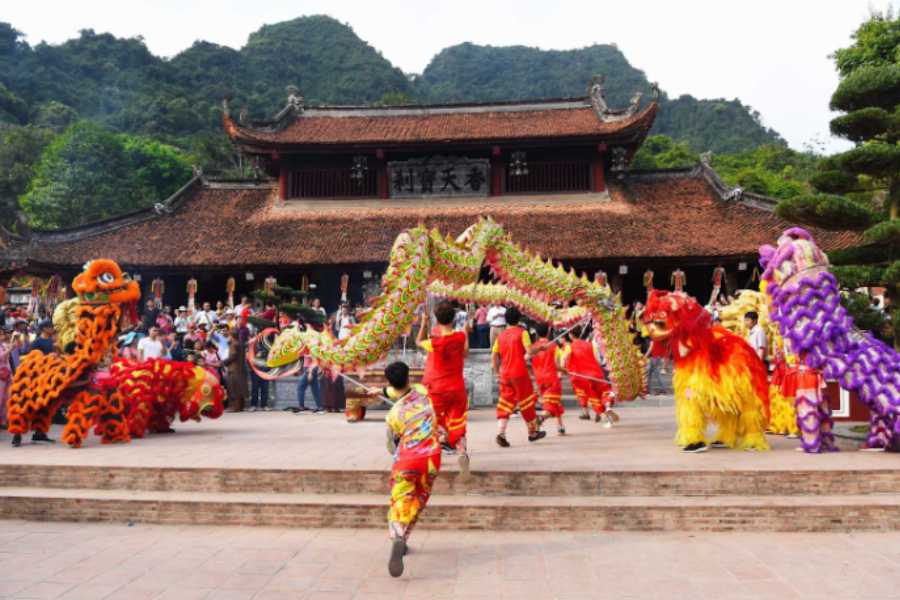
People of all ages come to Chua Huong to make offerings and pray for blessings. Some seek personal peace and happiness while others ask for career success, good exam results or safe childbirth. No matter their reason, the journey to the pagoda is seen as an act of devotion and a way to cleanse the soul for a fresh start to the year.
In addition to its spiritual meaning the Perfume Pagoda Festival also reflects the deep connection between Vietnamese culture and nature. The stunning natural surroundings, the rhythmic sounds of traditional boats, the echoing gongs in the mountains all come together to create an experience that is both deeply moving and unforgettable.
When Is the Perfume Pagoda Festival Celebrated?
The Perfume Pagoda Festival takes place every year starting on the 6th day of the first lunar month and continues until the end of the third lunar month. This usually falls between late January and late March according to the Gregorian calendar. The opening ceremony is a grand event, drawing hundreds of pilgrims and visitors from the early morning hours.
While the entire festival period spans several weeks, the most vibrant and crowded time is typically in mid-February. During this peak period, thousands of people make the spiritual journey to Chua Huong to offer incense, pray for good luck, and enjoy the festive atmosphere. Temples and caves within the Huong Son complex become alive with the sounds of bells, chants, and the scent of burning incense.
For many Vietnamese, visiting the Perfume Pagoda during this time is not only a religious ritual but also a meaningful way to begin the new year with hope and spiritual renewal.
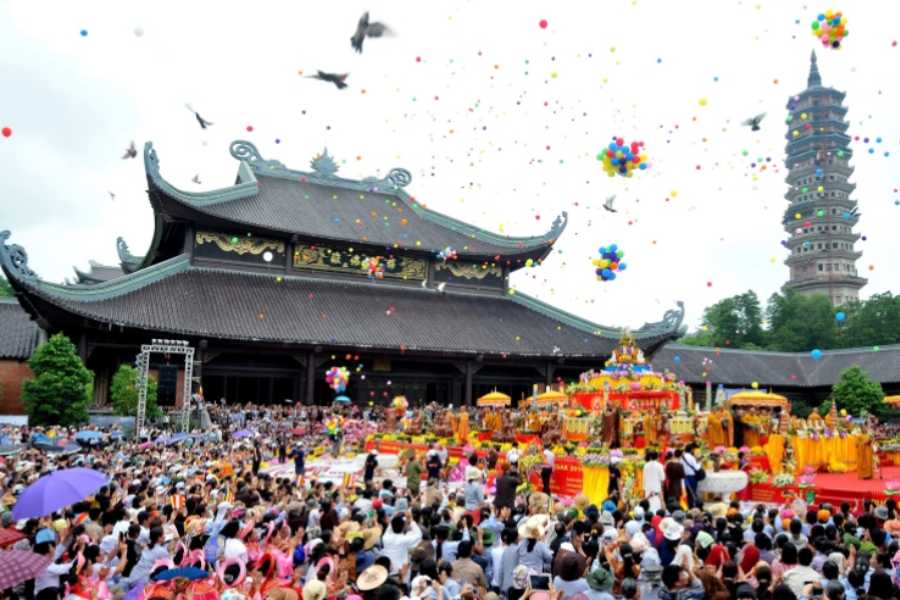
How to Get to the Perfume Pagoda
Reaching the Perfume Pagoda involves a combination of overland and river travel, offering visitors a journey as scenic and memorable as the destination itself. Located in Huong Son Commune, My Duc District, the pagoda complex lies about 60 kilometers southwest of Hanoi city center. Many Vietnam holiday packages include guided tours to the Perfume Pagoda during the festival season.
By Private Car or Taxi
If you are looking for comfort and convenience, traveling by private car or taxi is the best option. The ride from central Hanoi takes approximately one and a half hours, depending on traffic conditions. This method allows you to leave early in the morning, avoid crowded buses, and enjoy a smooth ride directly to Ben Duc Wharf. The cost typically ranges from 30 to 50 USD for a round trip, which is ideal for groups or families who want a hassle-free experience.

By Public Bus
For those on a tighter budget, taking the public bus is an economical and reliable alternative. You can catch bus number 211 from either My Dinh or Giap Bat Bus Station in Hanoi. The journey might take a bit longer than a private car due to frequent stops, but it provides a unique opportunity to observe daily life along the way. The fare is very affordable, usually around 2 USD per person.
.jpg)
By Motorbike
Adventurous travelers may choose to rent a motorbike and ride through the countryside. This option offers greater flexibility and a chance to fully enjoy the rural landscape of northern Vietnam. The route from Hanoi to Ben Duc takes about 1.5 to 2 hours, depending on your speed and breaks. With rice paddies, river crossings, and traditional villages along the way, the ride is scenic and refreshing. Motorbike rentals usually cost between 8 and 12 USD per day.
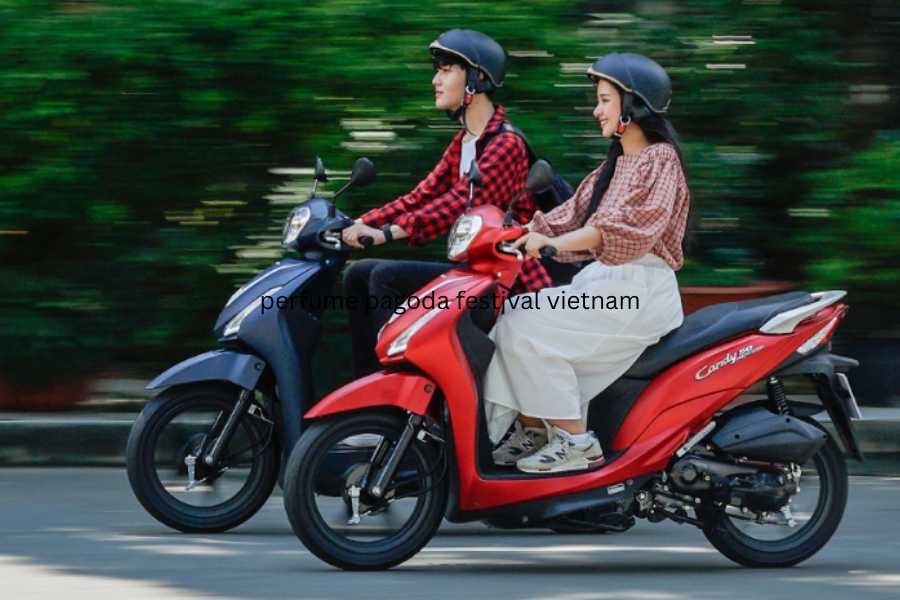
Boat Ride to the Pagoda
No matter how you travel to Ben Duc Wharf, the final leg of your journey will be by boat. From here, visitors must board a traditional rowing boat for a peaceful one-hour trip along the Yen River. This stretch is often described as one of the highlights of the experience. As you glide through calm waters surrounded by towering limestone cliffs and lush greenery, the spiritual atmosphere begins to unfold. The boat ride is not just a means of transportation, but a symbolic passage into a sacred and tranquil world.
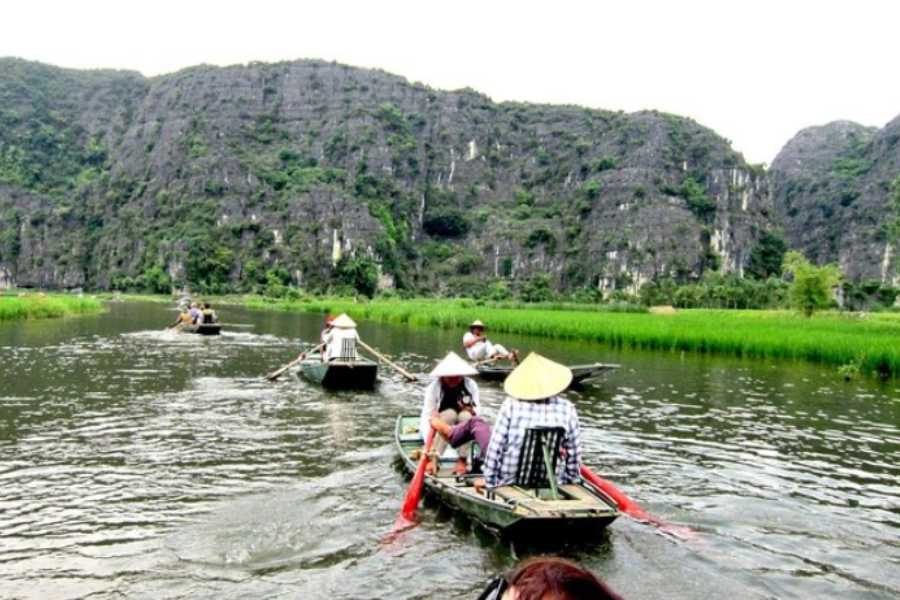
Key Activities During the Perfume Pagoda Festival
The Perfume Pagoda Festival is not only a spiritual pilgrimage but also a cultural celebration filled with sacred rituals and traditional experiences. Each visitor participates in meaningful activities that reflect centuries-old customs and beliefs.
Pilgrimage to Huong Tich Cave - The Heart of the Festival
At the core of the Perfume Pagoda Festival lies the pilgrimage to Huong Tich Cave, often regarded as the holiest cave in Vietnam. This cave is located deep within the mountain and serves as the most significant site within the entire complex.
To reach Huong Tich Cave, pilgrims must first journey along a forested path and then ascend hundreds of stone steps carved into the mountainside. For those who prefer a less physically demanding route, a cable car system is available, offering breathtaking views of the surrounding limestone peaks and lush valleys along the way.
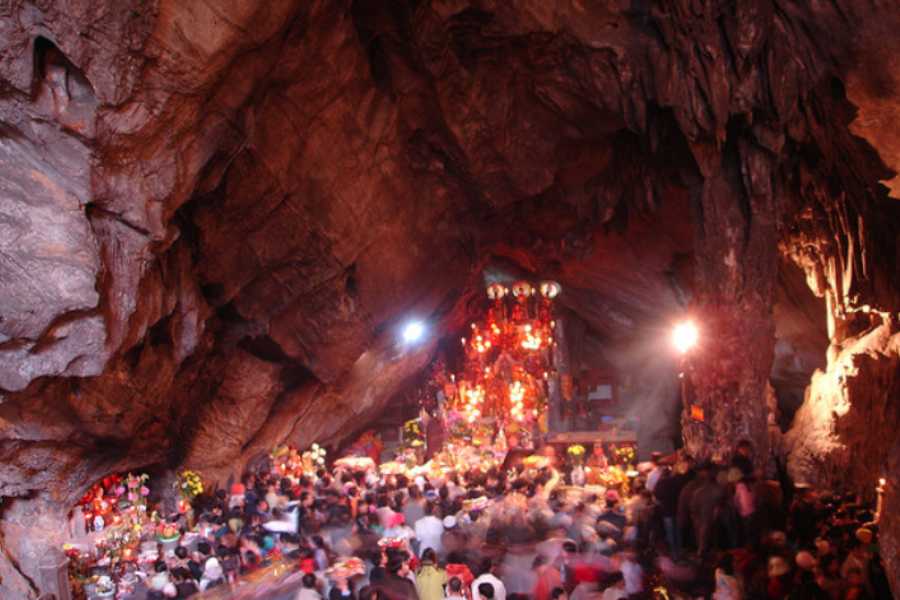
Once inside the cave, visitors are greeted by a mystical and sacred atmosphere. The cave houses numerous naturally formed rock structures, each with symbolic meanings. Among the most venerated are the formations known as the Rice Stalk, the Golden Tree, and the Silver Tree. These stones are believed to bring prosperity, good harvests, and financial luck to those who offer prayers.
Many pilgrims bring incense, offerings, and even gold leaf to leave at the altars. The scent of burning incense, the sound of chanting, and the dim glow from lanterns all contribute to a deeply spiritual ambiance. This act of devotion is seen not only as a way to seek blessings for the year ahead but also as a chance to cleanse the soul and strengthen one’s connection to Buddhist teachings.
Rowing Boat Journey on Yen Stream
The Perfume Pagoda pilgrimage does not begin at the pagoda itself but rather with a peaceful and scenic journey along the Yen Stream. This one-hour rowing boat ride is considered one of the most enchanting parts of the festival experience.
Departing from Duc Wharf, small traditional boats—often rowed by local women—glide slowly down the gentle waters of the stream. Along the way, travelers are treated to breathtaking views of misty mountains rising in the distance, jagged limestone karsts towering above the water, and lush green fields dotted with blooming wildflowers.
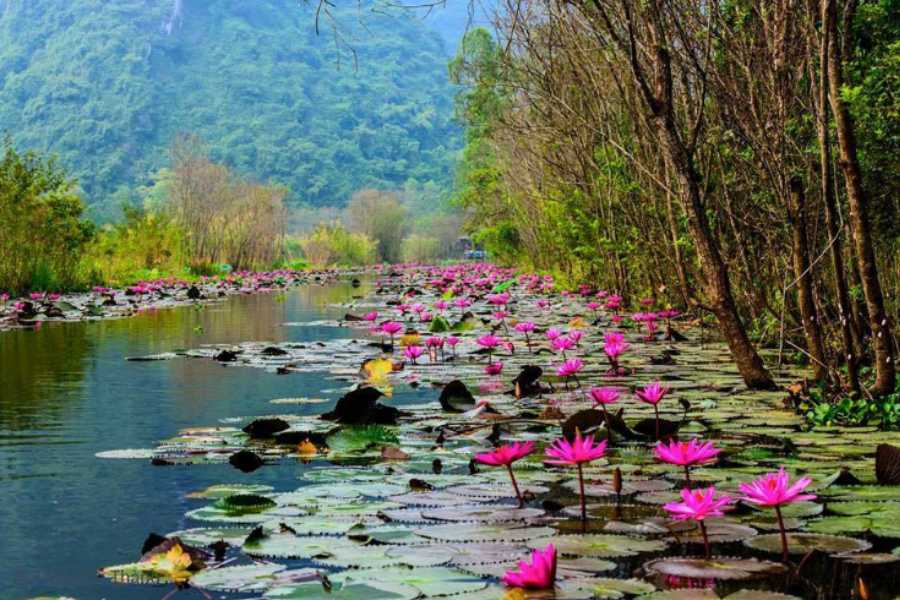
The landscape is quiet and meditative, broken only by the occasional splash of the oar or the distant call of birds. It sets a calm and reflective tone before reaching the more crowded and energetic parts of the pilgrimage site.
For many visitors, this tranquil boat journey is not just transportation but a symbolic part of the pilgrimage itself—an opportunity to leave behind the noise of daily life and slowly enter a space of peace, nature, and spiritual connection.
Visiting Temples & Pagodas in the Complex
The Perfume Pagoda complex is not only a place for prayer and pilgrimage, but also home to a variety of temples and pagodas, each with its own unique significance. As visitors make their way through the complex, they encounter sacred sites that have been revered for centuries.
Thiên Trù Pagoda (Heaven Kitchen Pagoda):
Often considered the gateway to the Perfume Pagoda, Thiên Trù Pagoda marks the starting point of the pilgrimage. Nestled at the base of the mountain, this serene temple serves as a place for pilgrims to prepare spiritually for the ascent. The temple is known for its tranquil atmosphere and beautiful surrounding nature, with offerings to the deities being made here before continuing the journey.
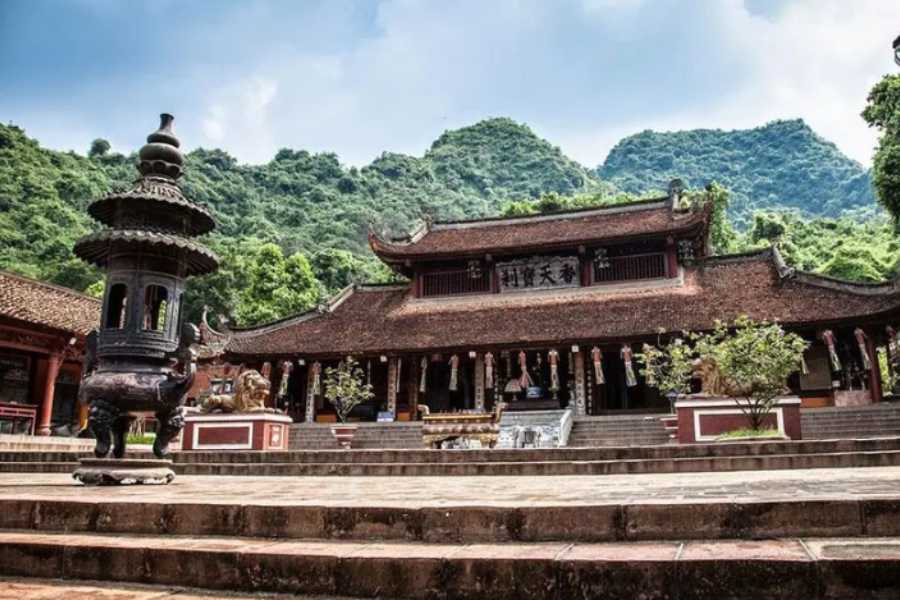
Giai Oan Stream (Purgatorial Water Stream):
A short walk from Thiên Trù Pagoda leads pilgrims to Giai Oan Stream, a symbolic and cleansing site. This stream is believed to purify the spirit, helping visitors let go of past misfortunes and negativity. Pilgrims wash their hands and faces in the stream, performing a symbolic cleansing ritual as they prepare for the next stages of their pilgrimage. The water is considered sacred and offers a sense of renewal and spiritual clarity.
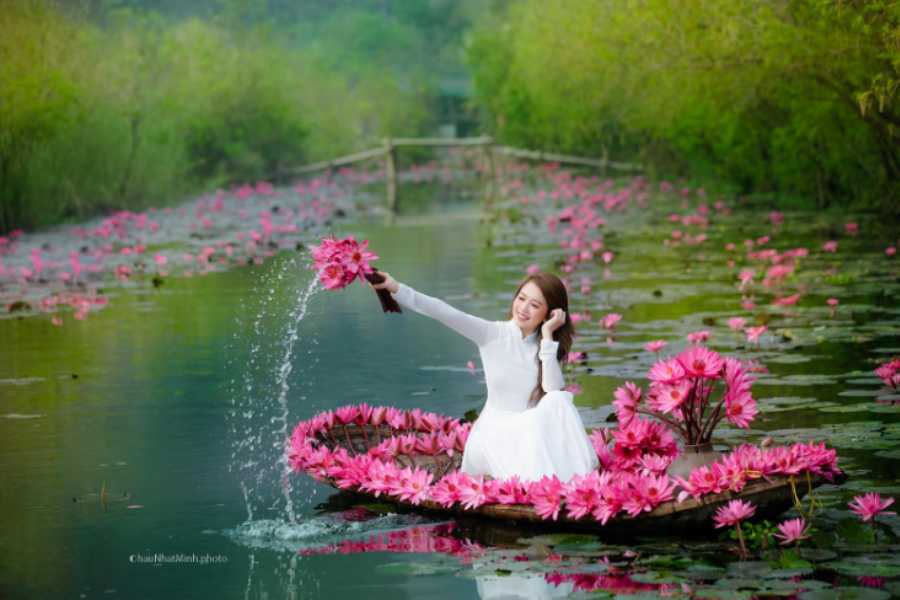
Long Van, Cua Võng, and Tuyết Sơn Pagodas:
As the pilgrimage continues, pilgrims visit other important pagodas such as Long Van, Cua Võng, and Tuyết Sơn. Each of these temples holds its own significance, offering different rituals and blessings. Long Van Pagoda is known for its peaceful ambiance, Cua Võng for its spiritual energy, and Tuyết Sơn for its historical importance. These temples provide moments of reflection and devotion, deepening the connection with the divine as visitors move closer to Huong Tich Cave.
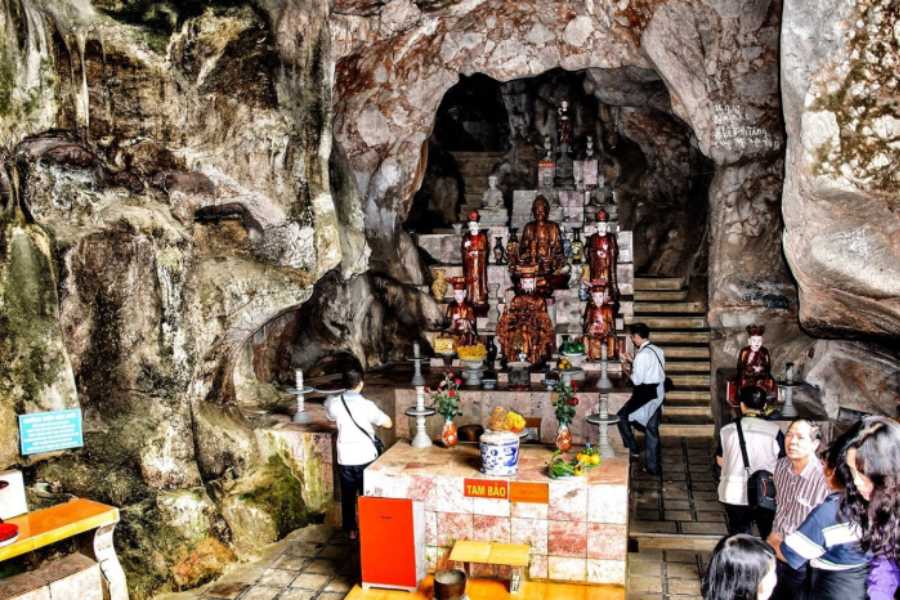
Traditional Prayers & Offerings
As part of the pilgrimage experience, traditional prayers and offerings are an essential element of the Perfume Pagoda Festival. Pilgrims come with reverence and devotion, bringing fruits, flowers, and incense as offerings to the Buddha and other deities worshiped within the pagoda complex.
Offerings
Fruits, flowers, and incense are the most common offerings made by pilgrims at the various temples and pagodas. These offerings are presented as acts of respect and devotion, with the belief that they will bring blessings and protection from the gods. The vibrant colors and fragrant scents of the flowers, along with the symbolic nature of the fruits, are considered to invoke the spirits of the deities in a favorable way. Incense, as a symbol of purification, is burned to connect the earthly world with the divine.
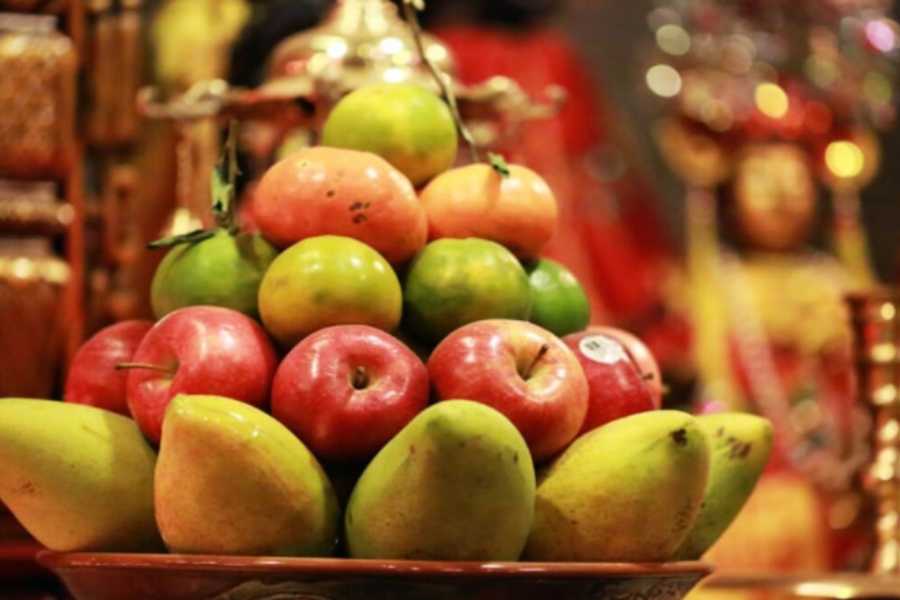
Prayers for Blessings
Many visitors come to the Perfume Pagoda to seek blessings for specific areas of their lives. The prayers vary depending on individual needs and desires, but the most common requests are for fertility, wealth, and academic success. Couples may pray for children, while students and scholars ask for wisdom and success in their studies. Business owners may pray for prosperity, and others simply seek good health and general well-being. These heartfelt prayers, coupled with the offerings, create a deep spiritual connection between the pilgrims and the divine forces they believe in. The ritual is a way to express hope, gratitude, and faith in the power of the sacred space.
Local Food & Festival Market
The Perfume Pagoda Festival is not just a spiritual journey, but also a vibrant cultural experience, and the local food and festival market play a significant role in this. Visitors can enjoy a variety of local delicacies and shop for unique souvenirs as they make their way through the bustling market.
Local Delicacies
One of the most iconic treats at the festival is Bánh trôi (floating rice cakes). These delicious, glutinous rice cakes are filled with sweet mung bean paste and often served in a warm, fragrant syrup. This traditional snack is a favorite among pilgrims and visitors alike, offering a taste of local culture. Another popular dish to try is sticky rice, often served with a variety of toppings such as sesame seeds, peanuts, or dried fruits, making it a flavorful snack to enjoy during the journey. For those who enjoy a more savory meal, local mountain goat meat is a must-try. This dish is a regional specialty and is typically cooked in various styles such as grilled or stewed, offering a unique taste of the mountain cuisine.
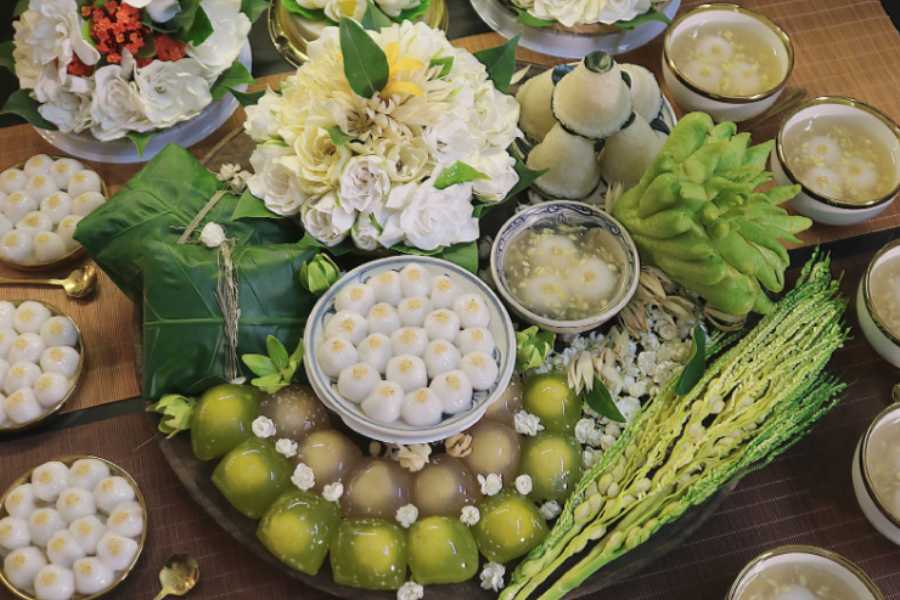
Festival Market
The vibrant market surrounding the Perfume Pagoda is a great place to immerse yourself in the local culture. Stalls are lined with Buddhist charms, offering spiritual symbols and amulets that are believed to bring good luck and protection. Visitors can also find a variety of souvenirs, from traditional crafts to artwork, perfect for remembering the spiritual journey. Additionally, the market features a wide range of medicinal herbs, many of which are locally grown and used in traditional Vietnamese healing practices. These herbs, often sold in bundles or as dried plants, are believed to have various health benefits and make for an interesting and unique souvenir. The market adds to the festive atmosphere, offering both spiritual items and authentic local products for travelers to explore.
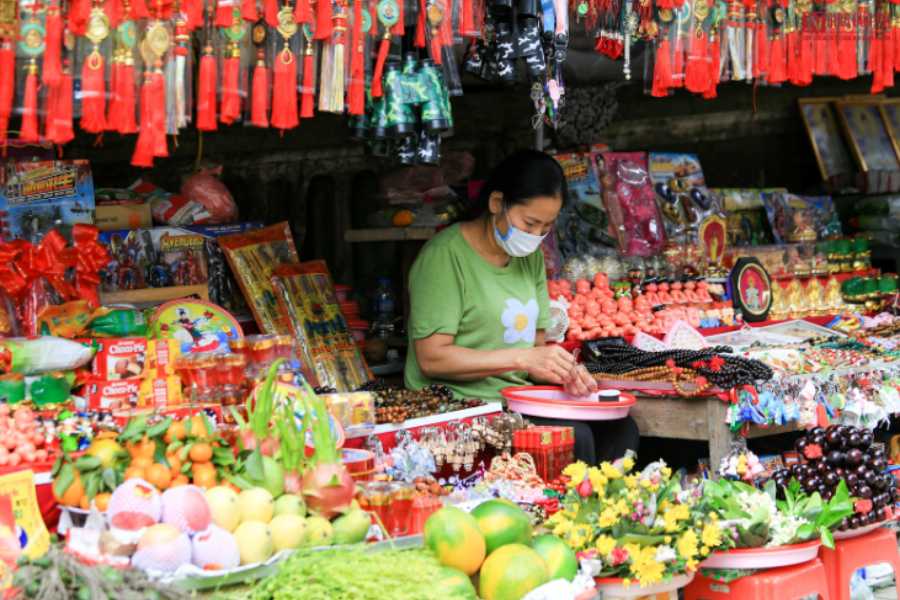
Travel Tips for Attending the Perfume Pagoda Festival
To make the most of your experience at the Perfume Pagoda Festival, here are some practical tips that will help you navigate the event smoothly and enjoy your time there.
Visit Early in the Morning to Avoid Large Crowds
The Perfume Pagoda Festival attracts thousands of pilgrims and visitors every year, so to get a more serene experience, it’s recommended to arrive early in the morning. This will not only help you avoid the crowds but also allow you to enjoy the peaceful atmosphere of the pagoda and surrounding areas before it becomes busier later in the day.
Dress Modestly as a Sign of Respect
As a religious pilgrimage site, it’s important to dress appropriately when visiting the Perfume Pagoda. Modesty is key, so make sure to wear long pants and cover your shoulders, especially when entering temples or sacred areas. This respectful attire ensures you blend in with the local customs and honor the spiritual significance of the site.
Wear Comfortable Shoes - The Trek to Huong Tich Cave Can Be Challenging
For those planning to hike up to Huong Tich Cave, be prepared for a bit of a workout. The trek involves climbing hundreds of stone steps, which can be tiring, especially in the heat. Comfortable, sturdy shoes are a must to help you navigate the steep climb comfortably. If you're not accustomed to hiking, consider taking breaks along the way to rest.
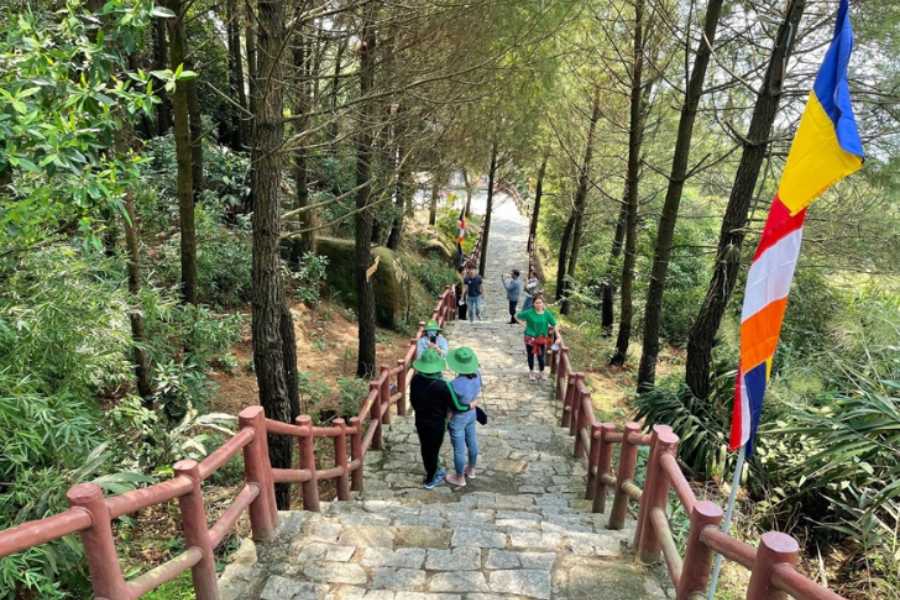
Bring Cash - No ATMs Available in the Area
The Perfume Pagoda area is quite remote, and there are no ATMs available on-site. To avoid any inconvenience, make sure to bring enough cash with you for any purchases, including boat rides, food, souvenirs, or offerings. It's always a good idea to carry small denominations to make transactions easier.
Opt for the Cable Car if You Prefer Not to Hike
For those who prefer a more relaxing way to reach the top, the cable car is a great alternative. The ride costs around $5-$7 and provides stunning views of the surrounding mountains and valleys. It’s a wonderful option for those who might find the hike challenging or simply want to enjoy the scenic journey without the physical effort. You can also book tickets in advance through a trusted Vietnam travel agency to avoid long queues.
Conclusion: Why Experience the Perfume Pagoda Festival?
Among the Top Traditional Festivals For Your Family In Vietnam, the Perfume Pagoda Festival stands out for its spiritual depth and scenic journey. Attending the Perfume Pagoda Festival is not just a visit to a religious site, but a deep cultural and spiritual journey that allows you to step into the heart of Vietnamese beliefs and traditions. For over a thousand years, generations of pilgrims have made their way through misty mountains and along serene rivers to reach Huong Tich Cave and offer their prayers. The festival is a time when ancient rituals, community connection, and personal reflection come together in one of the most breathtaking natural landscapes in northern Vietnam.
For spiritual seekers, the festival provides a chance to connect with centuries-old Buddhist practices. Many visitors come to pray for fertility, academic success, business fortune, and overall well-being. The sacred caves, symbolic rock formations, and reverent atmosphere all contribute to a powerful sense of devotion. Even for those who do not follow Buddhism, the experience of witnessing thousands of people moved by faith, surrounded by the peaceful sounds of bells and chanting, can be incredibly moving.
From a cultural perspective, the festival gives travelers a front-row seat to traditional Vietnamese customs that are rarely seen in the cities. From the vibrant procession of pilgrims, the exchange of offerings and blessings, to the lively local markets selling everything from rice cakes to folk medicine, every detail reflects the richness of Vietnamese heritage. The journey through the temples, pagodas, and countryside is more than scenic—it is symbolic of an inner spiritual path.
Nature lovers will also find themselves captivated by the journey. The boat ride along Yen Stream, passing by towering karsts and quiet waterways, feels like entering another world. The climb to the cave or ride on the cable car offers panoramic views of the forested hills. The entire pilgrimage route is a blend of natural wonder and human devotion, making it unlike any other religious event in Southeast Asia.
.jpg)
In the end, whether you come to make a wish, to explore history, or simply to enjoy the beauty of northern Vietnam, the Perfume Pagoda Festival offers something deeply meaningful. It is a once-a-year event that leaves a lasting impression on everyone who takes part. For travelers looking to go beyond the usual tourist spots and touch something truly timeless, this is an experience not to be missed.











